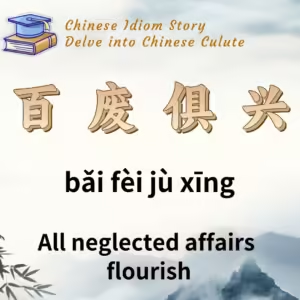
Chinese Idiom: 百废俱兴 (Bai Fei Ju Xing)
English Translation: All neglected affairs flourish
pīn yīn: bǎi fèi jù xīng
Idiom Meaning: This idiom describes a situation where all previously neglected or abandoned tasks and projects are revived and flourishing. It signifies a period of revitalization and progress.
Historical Source: 《岳阳楼记》 (The Yueyang Tower Essay) by Fan Zhongyan (范仲淹)
Idiom Story:
In the early 11th century, during the Northern Song Dynasty, Fan Zhongyan was demoted to the post of local governor in Dengzhou (modern-day Dengzhou, Henan) after the failure of his political reforms known as the “Qingli New Policies.” In 1045 AD, he was invited by his friend Teng Zijing (滕子京), who had been demoted to Yuezhou (modern-day Yueyang, Hunan), to write an essay commemorating the renovation of Yueyang Tower.
Yueyang Tower, originally built during the Tang Dynasty, had fallen into disrepair. Teng Zijing, upon his arrival in Yuezhou, managed to restore and expand the tower. Fan Zhongyan’s essay, 《岳阳楼记》, begins with:
“庆历四年春,滕子京谪守巴陵郡。越明年,政通人和,百废俱兴。”
Translation: “In the spring of the fourth year of Qingli, Teng Zijing was demoted to be the governor of Baling County. By the following year, with smooth governance and harmonious relations, all the neglected matters were revived.”
This passage illustrates that under Teng Zijing’s effective administration, the local affairs that had been neglected or deteriorated were revived and prospered. The phrase “百废俱兴” captures this transformation, indicating a comprehensive restoration of both infrastructure and community well-being.
Fan Zhongyan’s praise of Teng Zijing’s achievements became emblematic of how effective governance could restore and advance all facets of a community. Thus, “百废俱兴” has come to symbolize the revival and flourishing of all previously neglected endeavors.






